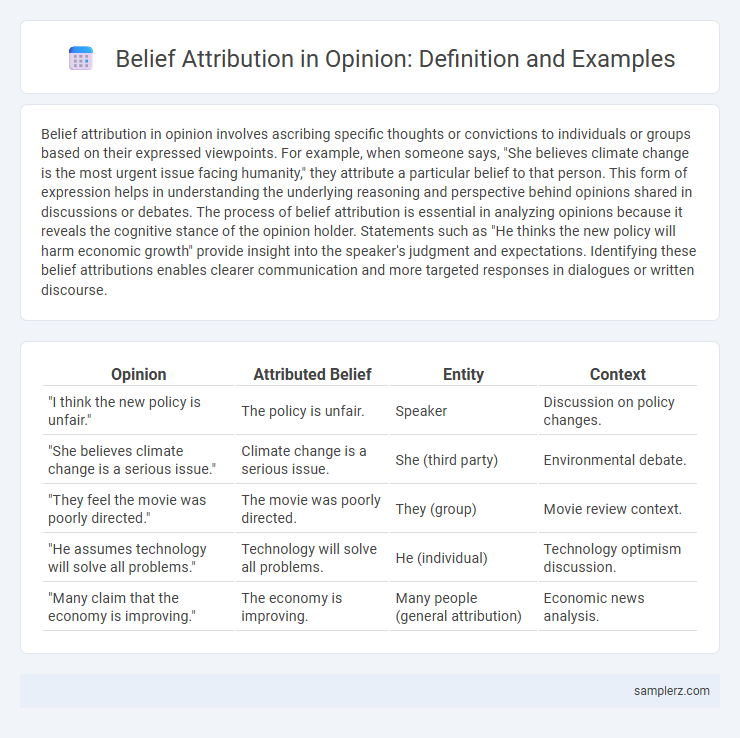Belief attribution in opinion involves ascribing specific thoughts or convictions to individuals or groups based on their expressed viewpoints. For example, when someone says, "She believes climate change is the most urgent issue facing humanity," they attribute a particular belief to that person. This form of expression helps in understanding the underlying reasoning and perspective behind opinions shared in discussions or debates. The process of belief attribution is essential in analyzing opinions because it reveals the cognitive stance of the opinion holder. Statements such as "He thinks the new policy will harm economic growth" provide insight into the speaker's judgment and expectations. Identifying these belief attributions enables clearer communication and more targeted responses in dialogues or written discourse.
Table of Comparison
| Opinion | Attributed Belief | Entity | Context |
|---|---|---|---|
| "I think the new policy is unfair." | The policy is unfair. | Speaker | Discussion on policy changes. |
| "She believes climate change is a serious issue." | Climate change is a serious issue. | She (third party) | Environmental debate. |
| "They feel the movie was poorly directed." | The movie was poorly directed. | They (group) | Movie review context. |
| "He assumes technology will solve all problems." | Technology will solve all problems. | He (individual) | Technology optimism discussion. |
| "Many claim that the economy is improving." | The economy is improving. | Many people (general attribution) | Economic news analysis. |
Understanding Belief Attribution in Opinion Formation
Belief attribution plays a crucial role in opinion formation by allowing individuals to infer others' mental states and intentions, which shapes their own viewpoints. For example, when someone attributes a belief about climate change to a trusted expert, they are more likely to adopt a similar opinion based on perceived credibility. Understanding this process highlights how social cognition influences the alignment and evolution of personal opinions.
Everyday Examples of Attributing Beliefs to Others
Attributing beliefs to others commonly occurs in daily interactions, such as assuming a coworker supports a project based on their enthusiastic comments or interpreting a friend's hesitation as disagreement. These everyday instances reveal how people use observable behavior and context to infer mental states, often leading to accurate or mistaken conclusions about others' beliefs. Understanding this process is essential for effective communication and social cognition in both personal and professional settings.
The Role of Belief Attribution in Shaping Opinions
Belief attribution plays a crucial role in shaping opinions by allowing individuals to infer the intentions, values, and reasoning behind others' viewpoints. This cognitive process helps people evaluate the credibility and relevance of information, influencing how opinions are formed and adjusted in social contexts. Understanding belief attribution enhances communication and empathy, fostering more nuanced and informed public discourse.
How Stereotypes Influence Belief Attribution
Stereotypes shape belief attribution by simplifying complex social information into generalized assumptions, often leading to biased judgments about individuals or groups. These cognitive shortcuts influence how people interpret others' behaviors and intentions, reinforcing preexisting prejudices. Understanding this process highlights the need for critical self-reflection to reduce stereotypical thinking in social perceptions.
Impact of Media on Belief Attribution in Public Opinion
Media outlets shape public perception by highlighting specific narratives, directly influencing how individuals attribute beliefs to social groups or political figures. The framing effects employed by television, newspapers, and online platforms contribute to bias formation, altering collective opinion through selective information exposure. Research indicates that repetitive media messaging enhances attribution accuracy but also risks reinforcing stereotypes, thereby impacting democratic discourse and policymaking.
Belief Attribution in Political Discussions
Belief attribution in political discussions often involves assuming opponents' motives or values, such as attributing bias or misinformation to support a particular agenda. This process shapes discourse by framing opposing views as rooted in irrationality or bad faith, impacting the quality and tone of debate. Understanding belief attribution helps reveal underlying cognitive biases and partisan divides that influence political communication.
Misattribution of Beliefs in Social Interactions
Misattribution of beliefs in social interactions often occurs when individuals incorrectly assume others hold the same opinions, leading to misunderstandings and conflicts. This cognitive bias, known as the false consensus effect, skews perception by exaggerating agreement within social groups. Research highlights that such misattributions can undermine effective communication and hinder conflict resolution by fostering false assumptions about shared beliefs.
Cognitive Biases Affecting Belief Attribution
Belief attribution in opinion is significantly influenced by cognitive biases such as confirmation bias and the halo effect, which distort the interpretation of others' intentions and beliefs. These biases lead individuals to selectively process information that aligns with their preconceived notions, resulting in misattributions and stereotyping. Understanding the impact of these biases is crucial for fostering more accurate and empathetic social judgments.
Case Studies: Belief Attribution in Controversial Debates
Case studies on belief attribution in controversial debates reveal how individuals attribute specific beliefs to opposing sides, often simplifying complex viewpoints to reinforce their own positions. Research highlights that such attributions can exacerbate polarization by entrenching perceived ideological divides, especially in topics like climate change or political reform. Understanding these dynamics aids in developing strategies to foster nuanced dialogue and reduce misinterpretation in contentious public discussions.
Improving Critical Thinking in Belief Attribution
Improving critical thinking in belief attribution involves analyzing the reasoning behind others' opinions by evaluating evidence and identifying potential cognitive biases. Recognizing the distinction between facts and interpretations allows for a more accurate assessment of belief validity. Developing skills such as empathy and perspective-taking enhances understanding of diverse viewpoints while maintaining objective judgment.

example of belief attribution in opinion Infographic
 samplerz.com
samplerz.com